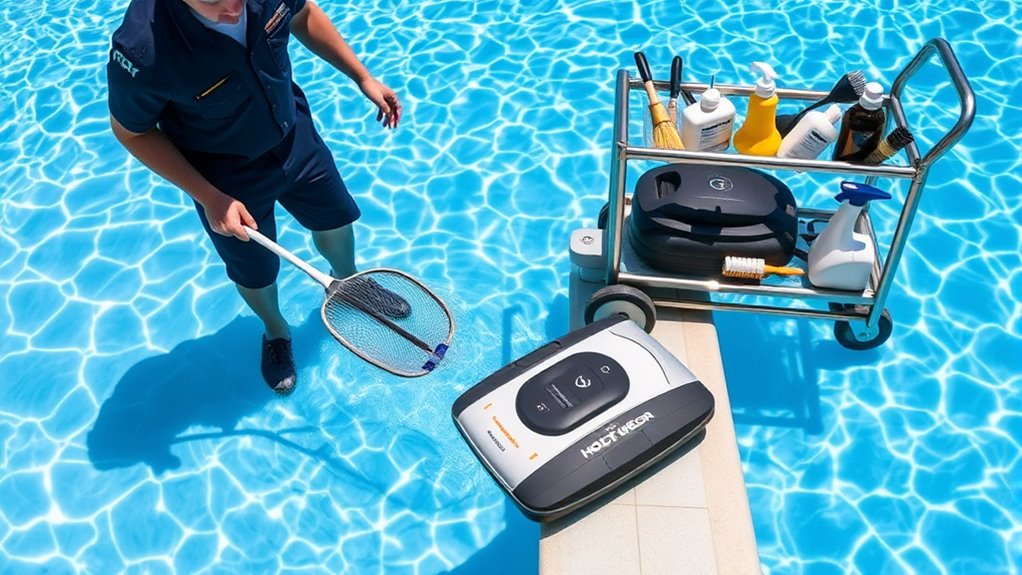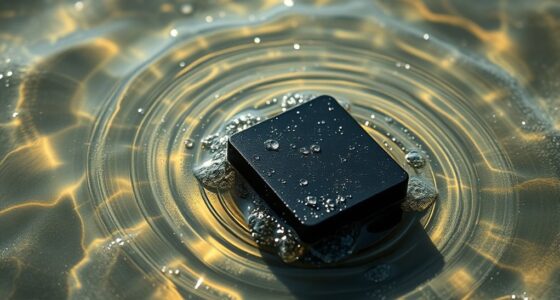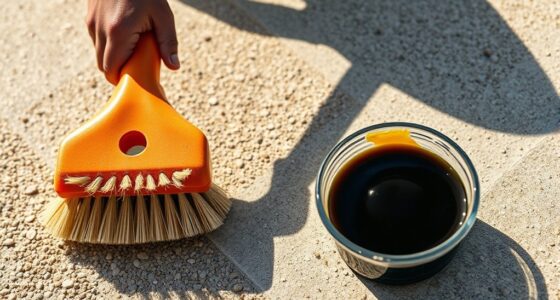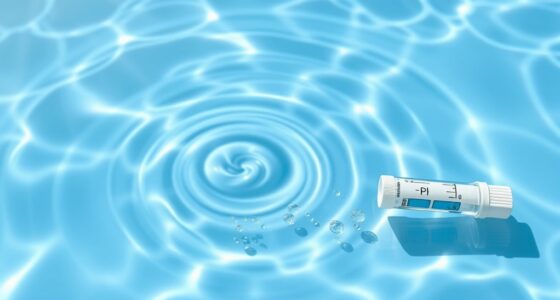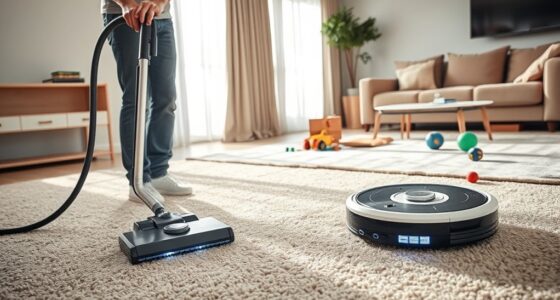To keep your pool in top shape, regularly check and adjust water chemistry by testing pH, chlorine, and alkalinity levels. Skim the surface daily and brush weekly to prevent algae buildup. Maintain your filter and pumps, checking for blockages and leaks. Seasonal tasks like backwashing filters and winterizing are key for long-term care. Staying on top of these basics guarantees clear, safe water—exploring further will help you master ongoing pool maintenance.
Key Takeaways
- Regularly test and adjust water chemistry, including pH, chlorine, and alkalinity, to prevent algae and maintain clarity.
- Daily skimming and weekly brushing keep debris out and prevent algae buildup.
- Monitor and maintain the filtration system and pumps for optimal water circulation and clarity.
- Backwash or clean filters regularly and cover the pool during off-season to protect equipment and water quality.
- Use automation tools and resources to streamline maintenance tasks and catch issues early.
Understanding Your Pool’s Water Chemistry

Understanding your pool’s water chemistry is essential for maintaining a safe and clean swimming environment. When water chemistry isn’t balanced, it can lead to problems like pool algae growth, which makes your pool look murky and unsafe. One often overlooked factor is water evaporation, which causes the water level to drop and concentrates chemicals, disrupting the balance. When water evaporates, minerals and other substances become more concentrated, increasing the risk of algae blooms and cloudy water. To prevent these issues, regularly test your pool’s pH, chlorine levels, and alkalinity. Keeping these parameters within the recommended ranges helps inhibit algae growth, maintains water clarity, and ensures your pool stays inviting and safe for every swim. Additionally, understanding your pool’s Net+ Certification Benefits can provide valuable insights into effective management techniques to optimize your pool’s maintenance routine. Staying informed about industry transformations like automation can also streamline your upkeep process and enhance efficiency.
Daily and Weekly Cleaning Tasks
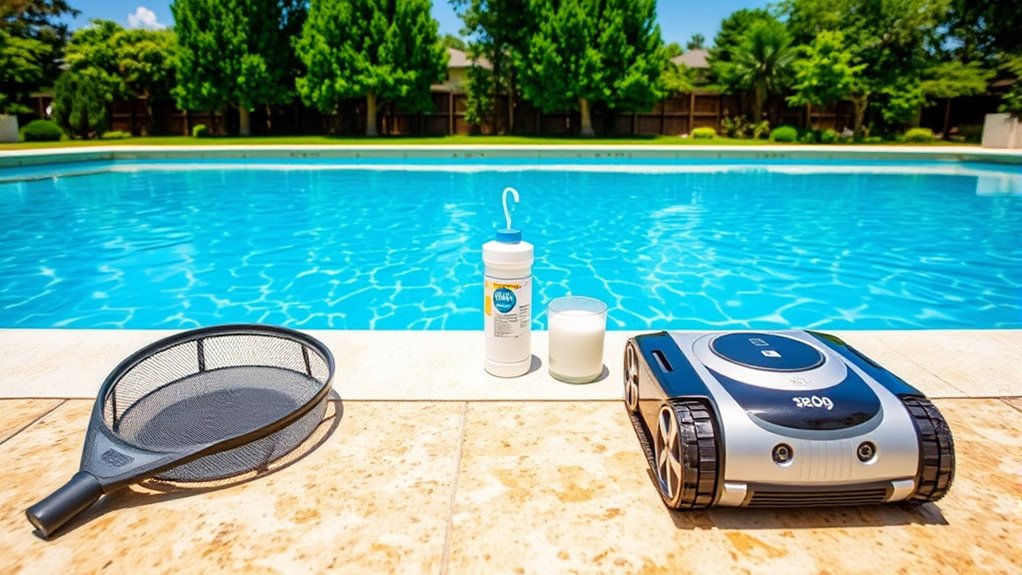
To keep your pool inviting, you need to perform daily skimming and brushing to remove debris and prevent algae buildup. Regular water chemistry checks guarantee your pool stays balanced and safe for swimming. Maintaining proper water chemistry is vital for preventing issues like algae growth and ensuring the longevity of your pool equipment. Consistently monitoring filtration systems helps maintain clear water and optimal performance. These simple tasks are essential for maintaining a clean and healthy pool environment.
Skimming and Brushing
Regular skimming and brushing are essential daily and weekly tasks to keep your pool clean and clear. Skimming removes leaves, insects, and debris that can cloud the water and promote algae growth. Use a net to quickly clear the surface each day, especially during windy or fall months. Brushing the walls and tiles weekly prevents algae buildup and removes dirt that brushing alone might miss. Focus on corners, steps, and areas with poor circulation. Proper leaf removal reduces organic material that feeds algae and helps maintain water clarity. Brushing also keeps algae control in check by disrupting its growth. Consistent skimming and brushing save you time and effort later by preventing more serious issues and ensuring your pool stays inviting and crystal clear.
Water Chemistry Checks
How often do you check your pool’s water chemistry? Regular testing is essential for proper chemical balancing and maintaining safe, clear water. You should check the water’s pH levels daily and adjust pH control as needed to keep it between 7.2 and 7.6. This prevents irritation and protects your pool equipment. Additionally, test for chlorine or sanitizer levels weekly to ensure proper disinfection. If levels are off, add the appropriate chemicals to restore balance. Keeping a consistent schedule helps you catch issues early and avoid costly repairs. Proper water chemistry checks ensure your pool stays inviting and safe for swimmers, while also prolonging the lifespan of your equipment. Regularly monitoring air quality indicators can help identify potential issues before they become more serious. Understanding water chemistry is crucial for effective pool upkeep.
Monitoring and Adjusting Chemical Levels
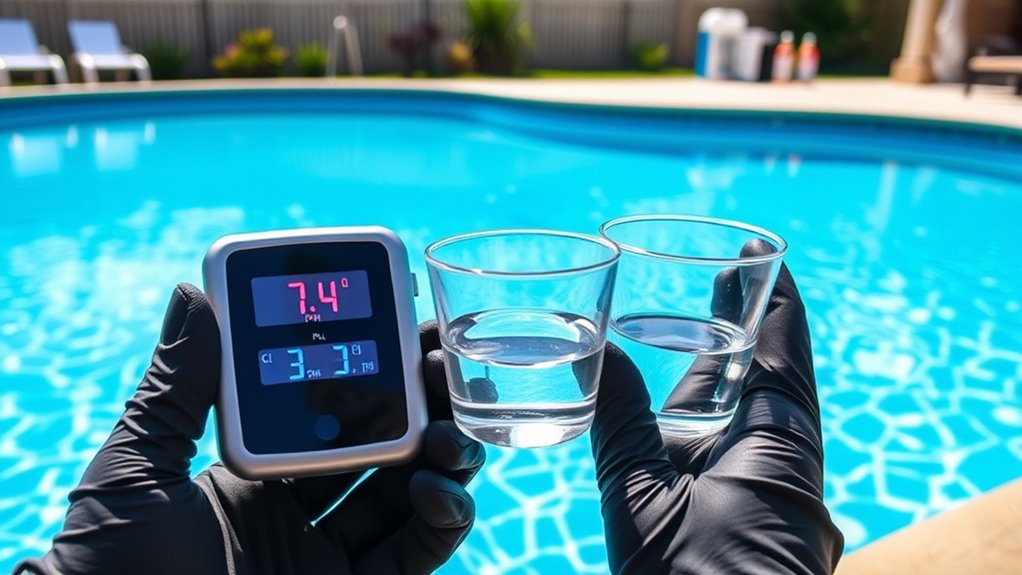
Monitoring and adjusting chemical levels is vital for keeping your pool safe and inviting. Regular checks help you maintain proper pH balance, prevent algae growth, and ensure water clarity. To keep everything in check:
- Test pH levels and adjust with pH increasers or decreasers
- Use chlorine or sanitizers for algae control and sanitation
- Keep alkalinity within the recommended range
- Add stabilizers to protect chlorine from sunlight breakdown
- Remember that a balanced pool environment fosters a healthier, more enjoyable swimming experience. Staying aware of AI-driven security systems can help protect your pool equipment from theft or vandalism.
Balancing pH is essential because it affects sanitizer effectiveness and prevents skin irritation. Proper chemical adjustments inhibit algae growth and maintain sparkling water. Remember to test your water at least once a week and make small adjustments as needed. Staying proactive ensures a safe, clean pool that’s always ready for swim time.
Managing Filtration Systems and Pumps
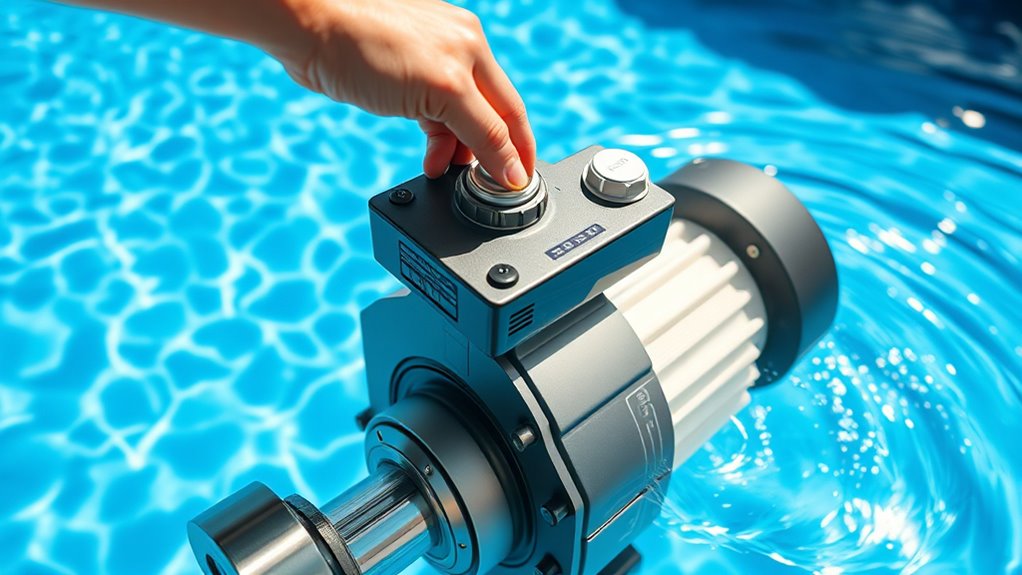
You need to understand how your pump operates to keep your pool clean and clear. Regularly check that it’s running correctly and adjust settings as needed. Additionally, maintaining your filter properly helps guarantee ideal water flow and clarity. Paying attention to paint sprayer maintenance can extend the lifespan of your equipment and ensure consistent performance. Understanding industry trends can also help you stay updated on the latest pool technology and maintenance practices.
Pump Operation Basics
Understanding how to operate your pool’s filtration system and pumps is essential for maintaining clean, clear water. Proper pump operation guarantees efficient filtration and extends equipment life. Pay attention to pump noise; loud or unusual sounds may signal a problem. When installing or adjusting your pump, consider pump placement carefully—place it on a stable, level surface away from noise-sensitive areas. Regularly check for leaks and ensure the pump is primed correctly. Keep an eye on the pressure gauge; high readings suggest it’s working hard, possibly needing maintenance. To optimize performance, you might:
- Adjust the valve settings for proper water flow
- Schedule routine inspections
- Clean out pump baskets regularly
- Ensure the pump is free from debris
- Proper pump operation can also help prevent equipment damage and improve energy efficiency. Additionally, monitoring filter system performance ensures your pool stays well-maintained and safe for swimming. These steps keep your system running smoothly and extend its lifespan.
Filter Maintenance Tips
Maintaining your pool’s filtration system is key to keeping the water clean and clear. Regularly check and clean your filter to prevent debris buildup that can hinder circulation. When selecting a pool cover, choose one that keeps out leaves and dirt, reducing the strain on your filter. This also simplifies pool heater maintenance, as a cleaner pool reduces the workload on your heater. Rinse the filter cartridges or backwash the sand or DE filter according to your manufacturer’s instructions, usually every few weeks. Make certain your pump runs efficiently by avoiding blockages and maintaining proper water flow. Proper filter maintenance extends equipment lifespan and improves water quality, making your pool more inviting and easier to care for. Additionally, understanding angel numbers related to love and transformation can inspire a positive mindset during your pool upkeep routine. Regular monitoring of your pool’s automation systems can help detect issues early and ensure consistent operation.
Preventing and Addressing Common Issues
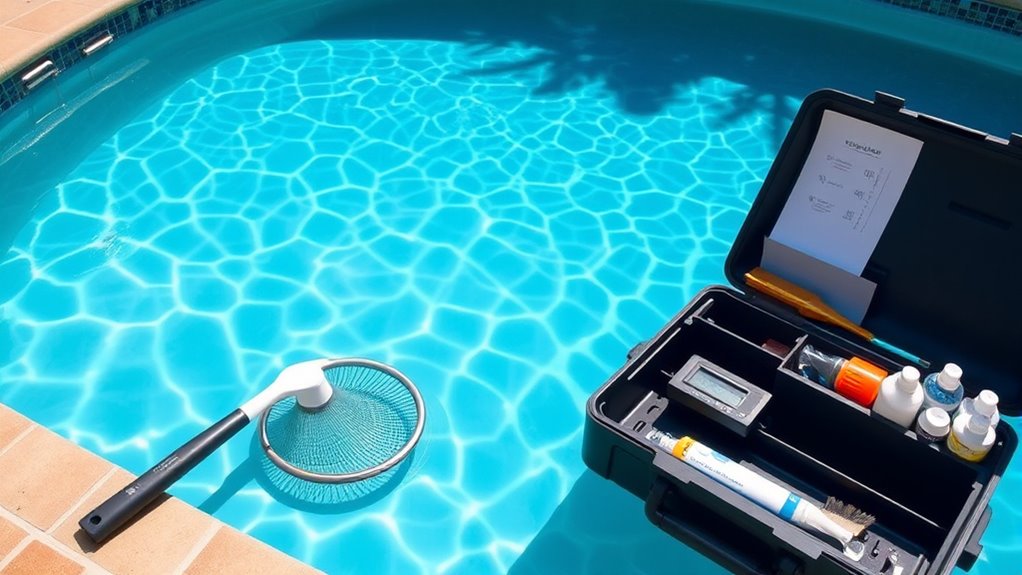
To keep your pool in top shape, it’s essential to identify and address common issues before they escalate. Algae prevention is key—regular brushing, proper chlorine levels, and maintaining balanced pH help prevent growth. Equipment troubleshooting can save you time; check your pump and filter regularly for blockages or leaks. Keep an eye out for cloudy water, which signals chemical imbalance or algae buildup, and inspect skimmers and drains for debris. Address issues promptly by adjusting chemicals or cleaning equipment. Staying proactive ensures your pool remains inviting and safe for swimming. Additionally, understanding Resources and Tools available for pool maintenance can help you stay informed and prepared for any challenges.
Seasonal Maintenance Tips
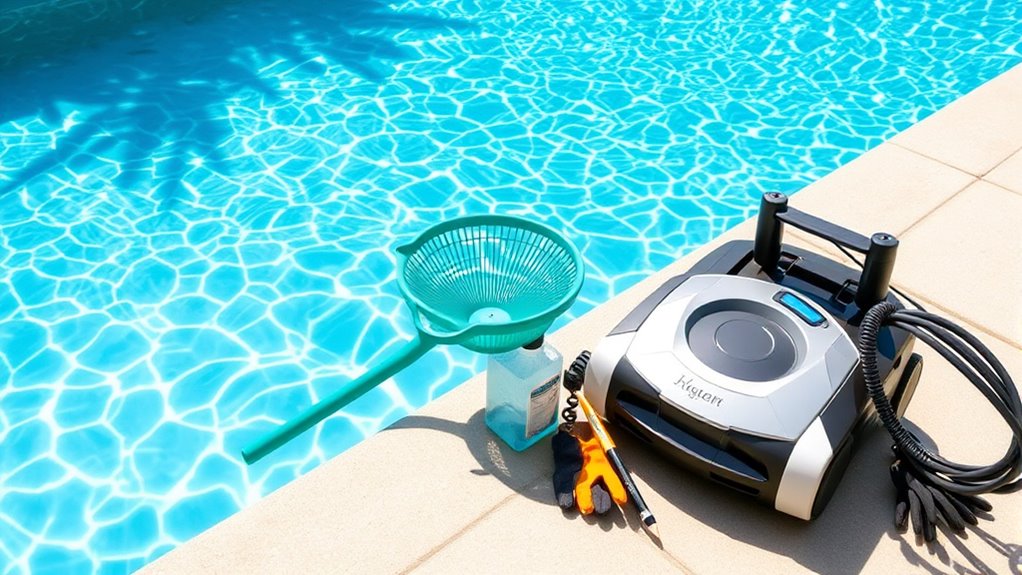
As the seasons change, it’s essential to adjust your pool maintenance routines to keep your water clean and safe. Proper seasonal care prevents issues like algae growth and simplifies winterizing. In spring, test and balance your water, then add algae control agents if needed. Before winter, follow these winterizing tips: lower the water level, drain equipment, and cover your pool. Regularly inspecting your pool’s water chemistry ensures optimal conditions and prevents costly repairs. Incorporating automation’s role in business intelligence can also help monitor your pool’s parameters more effectively.
Frequently Asked Questions
How Often Should I Drain and Refill My Pool Completely?
Think of your pool as a living thing that needs fresh air to thrive. You should drain and refill your pool every 3-5 years, depending on usage and water quality. Regular water testing and chemical balancing help determine when a full drain is necessary. If water becomes cloudy or chemical levels are hard to stabilize, it’s time for a complete refill to keep your pool safe and inviting.
What Are the Signs of a Failing Pool Pump?
If your pool pump makes unusual noises or struggles to circulate water, these are signs it might be failing. You might notice strange pool pump noises like grinding or squealing, which indicate motor problems. Also, electrical issues can cause the pump to stop working or trip the circuit breaker. Pay attention to these signs, as ignoring them could lead to more serious damage or costly repairs down the line.
How Do I Prevent Algae Growth in My Pool?
To prevent algae growth, you need to maintain proper chemical balance and control pool shading. Regularly test and adjust pH and chlorine levels to keep the water sanitized. Use algaecide treatments as needed, especially if your pool is shaded or receives limited sunlight, which encourages algae. Cover your pool when not in use to reduce debris and sunlight exposure, creating an environment less favorable for algae to thrive.
When Should I Replace My Pool’S Filter Cartridges?
Many believe replacing your pool filter cartridges is solely based on visible dirt, but that’s not always true. You should replace them based on their lifespan, typically every 1 to 2 years, depending on usage and water quality. Follow your cartridge replacement schedule, and inspect for signs like reduced flow or damage. Regular maintenance extends filter life, ensuring your pool stays clean and clear.
What Safety Precautions Should I Follow During Pool Maintenance?
During pool maintenance, you should prioritize pool safety by wearing protective gear like gloves and goggles to prevent chemical exposure. Always handle chemicals carefully, following manufacturer instructions, and never mix them to avoid dangerous reactions. Keep your pool area clear of obstacles, and guarantee proper ventilation. Regularly check your equipment for safety issues, and educate yourself on emergency procedures. Staying vigilant and cautious ensures a safe, enjoyable swimming environment.
Conclusion
Keeping your pool in top shape doesn’t have to be overwhelming. Regular maintenance reduces the chance of costly repairs and keeps your water crystal clear. Did you know that improper chemical balance is responsible for 80% of pool issues? By understanding your water chemistry, staying on top of cleaning, and managing equipment, you’ll enjoy a safe, inviting oasis all season long. Jump into your pool maintenance with confidence—you’ve got this!
